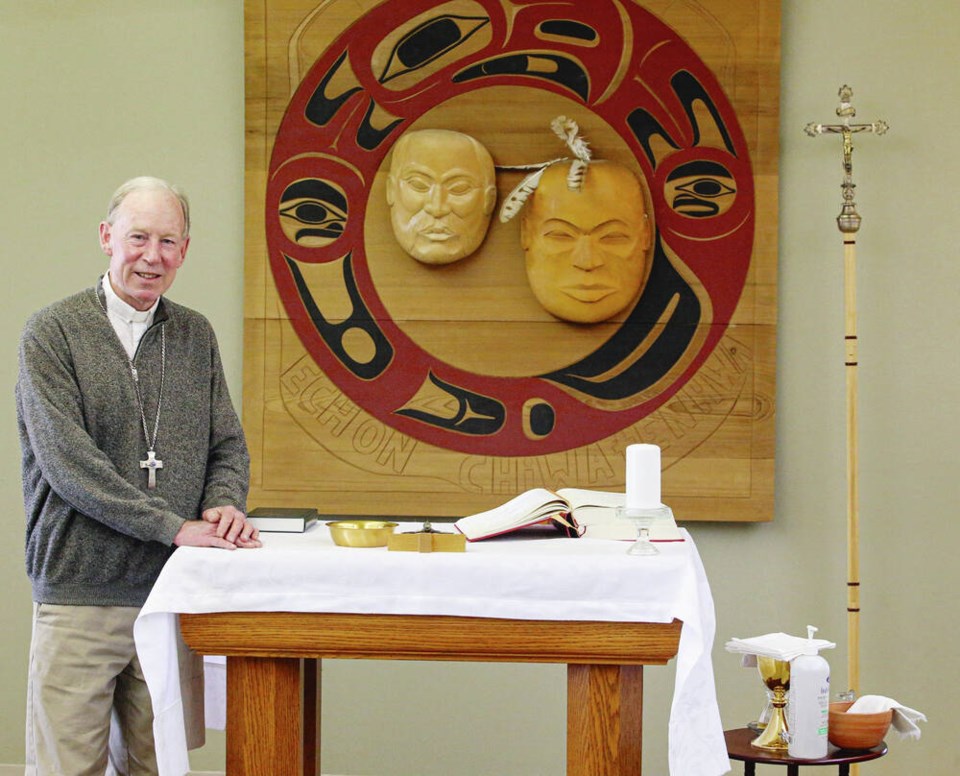Christmas religious services are traditionally standing-room only, but with the newest COVID-19 restrictions, capacity at most places of worship will be held to 50 per cent, with extra areas opened up to accommodate everyone safely.
Both Catholic Bishop Gary Gordon and Anglican Bishop Anna Greenwood-Lee say cathedrals will be kept to half capacity to comply with recent provincial health orders. Those orders limit attendance for faith gatherings to 50 per cent if not all participants are vaccinated, or 100 per cent if all are vaccinated.
As the pandemic continues into a second Christmas season and cases of the new COVID-19 variant Omicron turn up in B.C., health orders also require that masks be worn by everyone age five and older at religious gatherings, including choir members.
Gordon, who represents the Diocese of Victoria, said he reintroduced a mask requirement in September. But while congregations have been encouraged to get vaccinated, priests don’t want to turn away people away at the door because of their vaccination status, especially at Christmas.
“Our encouragement is for people to to do whatever is gonna make them feel most secure and safe and healthy and happy and at peace — I mean, peace is the big Christmas message, right?” said Gordon, who will livestream a Christmas Eve mass at 5 p.m. from Port McNeill.
“If you’re feeling well and you’re healthy and you don’t have any immuno-compromised health conditions, come on out,” he said. “But if you’ve got any health issues, or you’re looking after an elderly person or someone who is immuno-compromised, then you should stay home and look after what you need to look after — we’re encouraging people to find their place of peace.”
Greenwood-Lee said the Anglican Islands and Inlets diocese has required congregations to wear masks during the entire pandemic, and has consistently limited capacity to 50 per cent, which has led some churches to take registrations for Christmas Eve. The unvaccinated have been asked to worship online, she said.
Although it can be difficult for smaller venues, masks and capacity limits are a small price to pay to keep everyone safe, Greenwood-Lee said.
Choir members have been learning to sing with masks and shields, and some churches are adding extra services to be able to accommodate everybody.
“We’re pleased with our ability to adapt,” said Greenwood-Lee, who encourages people to call or check websites to find in-person and livestream times for services and to learn if registrations are being taken.
Greenwood-Lee isn’t worried that crowds of people will have to be turned away, since most people would unlikely to be comfortable attending a full church amid the pandemic.
“We think it’s important to say to the public if you come to an Anglican church over Christmas everyone will be masked and it will be at a 50 cent capacity maximum and then people can decide if they’re comfortable with that or if they prefer to worship online,” she said.
Sridevi Ganti, public relations officer for the Hindu Temple on Cultra Avenue in Saanichton, said the five-day Hindu festival of lights, Diwali, was held in November, prior to the latest provincial health orders enforcing masks and capacity limits. Despite this, “most people were already wearing masks,” she said.
People were required to register to come to the temple, which allowed the administration to space out arrival times for prayer and to confirm the number of meals needed. Hundreds of meals that would usually be served at the temple were boxed and taken home by the congregation, she said. The next celebrations at the temple will be a wedding and baby shower before a New Year’s type festival. The Hindu new year is March-April but for Jan. 1, there will be a small celebration — Havan, prayer to the fire God.
“People may be partying until 4 a.m., but in the morning they want to shower and start the new year by coming to the temple,” she said. All coming are asked to be vaccinated: “We continue with full vaccination required, masks, and 50 per cent capacity — we want to do all the three,” said Ganti.
Mahmoud Shaheed of the Masjid Al-Iman mosque on Quadra Street said all provincial health restrictions were updated at the mosque on Dec. 1 as required.
“We informed everyone that those who are vaccinated … we should be fine provided that we have our masks on and follow the proper hygiene and all the precautions to prevent the spread of the virus,” said Shaheed, a pharmacist.
People at highert risk, such as seniors and those with chronic diseases or who are immune-compromised, are advised to avoid bigger congregations, said Shaheed. For Jummah prayer, or weekly prayer, COVID-19 symptom screening is done at the door and those who are unvaccinated have been allotted an outdoor space to worship.
Everyone is accustomed to the protocols and wants to keep the mosque open and avoid unnecessary shutdowns or added restrictions, said Shaheed. “We are all trying to work together to keep everyone safe.”
Rabbi Meir Kaplan of Chabad 91原创 Island said masks have been mandatory in synagogues. With Jewish high holidays in September and October having passed, and the recent celebration of Hanukkah typically taking place at home, capacity restrictions have not had impact on celebrations as yet.
Kaplan believes those in need shouldn’t be denied entry to a place of worship, whether or not they are vaccinated.
“I try to convince people, explain, but I don’t think faith communities should be rejecting people who are not vaccinated,” said Kaplan. “But at the same time I think the government compromise is very reasonable in saying, you know, if you’re not going to accept your vaccine, in that case [places of worship] will have to have less capacity.”



